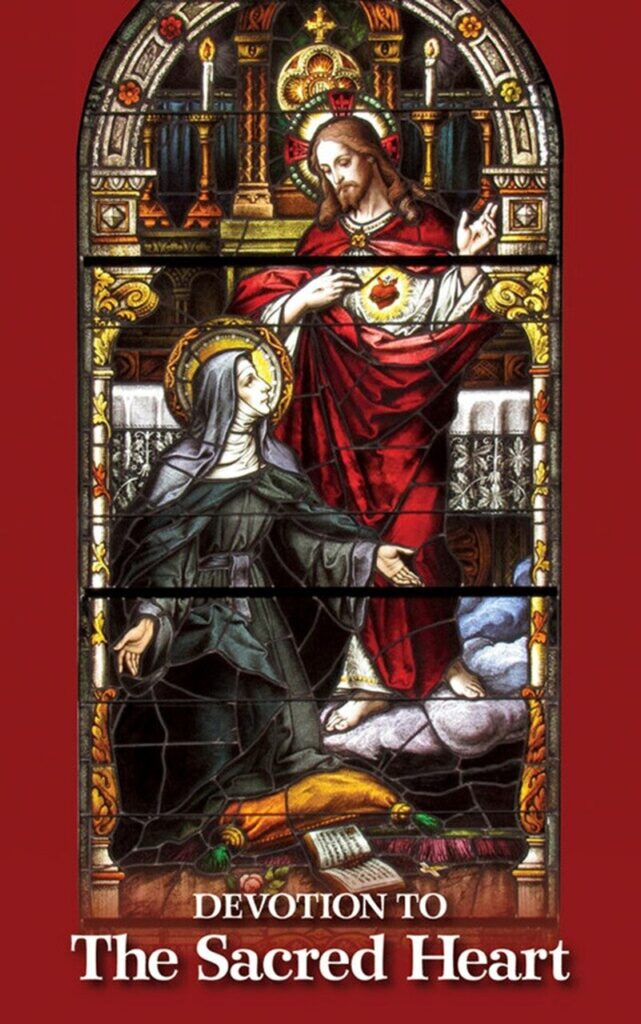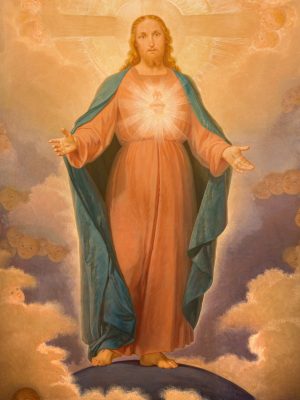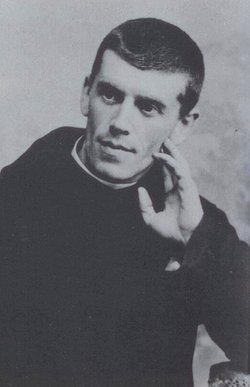By Original Sin man lost Sanctifying Grace and thereby forfeited the right to Heaven. But God, in His merciful love, had decreed from eternity to restore him to the state of supernatural grace and to make him worthy of eternal happiness. This was to be accomplished by the Incarnation of the Son of God, who, in place of the fallen human race, would render perfect satisfaction to Divine Justice.
Accordingly, in the fullness of time the Eternal Son of God became man, by the power of the Holy Spirit, assuming human nature in the womb of the virginal Mother, Mary. In the mystery of the Incarnation, the Divine and human natures were inseparably united in the Second Person of the Blessed Trinity, in the “hypostatic” union.
By virtue of the hypostatic union of the two natures, it follows that all the actions and all the sufferings of Jesus Christ are of infinite worth and merit because they are deeds of a God Incarnate and are referred to the Divine Person.
Redemption began with the Incarnation, and the first act of homage and love of the Incarnate God ascended to Heaven to the Eternal Father from the blessed Heart of Jesus which throbbed in Mary’s womb.
Love of the Sacred Heart In the Redemption
For 30 years the Incarnate Word of God was hidden and almost unknown. True, His Immaculate Mother, St. Joseph and a few other favored ones knew Him and returned love for love to His Divine Heart, but outside of this little circle, Jesus was not known. Yet His mercy embraced the whole world; sweet love and holy, silent reparation ascended to Heaven at every moment, day and night, from His Sacred Heart to appease the just wrath of the Eternal Father.
The entire life of Jesus Christ on earth had no other object than the Redemption and restoration of the human race. It was a life of abasement in His Incarnation, in His birth and in His hidden and public life, which terminated in His Passion and Death. By the agonizing tortures and most profound humiliations of His Passion, and especially by His Death on the Cross, Jesus became our Redeemer who rendered super- abundant satisfaction for our sins. Even though the sins of mankind are almost infinite in number and enormity, and an infinite offense against God, yet the Life, Passion and Death of the God-man have made perfect reparation for these offenses.
He was able to do this in our stead because He is our Head and we are His members, and whatever He has done in satisfaction for our sins will be considered by God as though we ourselves had done it. Still, we must not forget that despite this perfect and superabundant satisfaction, the gift of the Death of Christ will be beneficial only to those to whom the merit of His Passion is applied, only to those who cooperate with the graces of Redemption. These are applied principally through the holy Sacraments, whereby Sanctifying Grace is either imparted to us or increased.
What gratitude, what love, what thanksgiving we owe to the Divine Heart of Jesus for these inestimable benefits for our salvation! Oh, let us praise and love that blessed Heart which at every pulsation sent the Precious Blood through the veins of our Saviour during the whole course of His earthly life; that loving Heart which broke with anguish on the Cross for our Redemption; that Heart which, in the Blessed Sacrament, is always present, really, truly and living, and which has ever loved us and desires to love us eternally; that Heart which is the source of all graces, the seat and center of the infinite and incomprehensible love of Jesus Christ for all mankind.
Love of the Sacred Heart In the Blessed Sacrament
The sufferings and death of our Divine Redeemer on the Cross did not satisfy the love of His Sacred Heart. When about to ascend to His Heavenly Father, His infinite power and wisdom invented a means by which He might be in Heaven with His Father and at the same time remain on earth with His beloved children. The Blessed Eucharist is this Divine invention.
It was the last and greatest expression of the burning love of the Sacred Heart of Jesus before His Passion. It was His last legacy to us in fulfillment of His promise not to leave us orphans. In the Blessed Sacrament, Jesus Christ is really, truly and substantially present, with His Body and Blood, with His Soul and His Divinity. He is personally present, not by a mere sign or image, not in a spiritual manner only.
Devotion to the Sacred Heart, as expressly declared by the Sacred Congregation of Rites, is essentially the same as devotion to the Blessed Sacrament. It honors the Divine love of our Eucharistic God which revealed itself in His Passion and Death and continually reveals itself in the Holy Eucharist. Therefore, the Sacred Heart devotion is the most agreeable to Our Lord in the Blessed Sacrament.
In fact, the revelations of saints prove that Jesus wishes devotion to His Divine Heart to be inseparably connected with the Blessed Sacrament. In the following touching words He spoke to St. Gertrude of the love of His Sacred Heart in the Holy Eucharist:
“My delights are to be with the children of men. To satisfy My love I have obliged Myself to remain therein even to the end of the world, and I wish It [the Holy Eucharist] to be frequently received. Should anyone deter a soul in the state of grace from Communion, he would impede the delight of My Heart. I have done My utmost to manifest the tenderness of My Heart in the Blessed Eucharist.”
The revelations of the Sacred Heart to St. Margaret Mary also show most clearly that the Divine Heart wishes this devotion to be practiced in connection with devotion to the Holy Eucharist. About 70 revelations to St. Margaret Mary have been handed down to us, and the greater number of these proceeded from the Sacred Host in the tabernacle. The solemn reparation which Our Lord desires, He asks in satisfaction for the insults offered to Him in the Sacrament of His Love. Oh, the infinite love of the Sacred Heart of Jesus dwelling day and night on our altars! This love has compelled Him to abide in hundreds of thousands of tabernacles and to remain with us till the end of time.
If we are animated by a true devotion to the Sacred Heart, we shall feel urged to visit Our Lord in the tabernacle frequently. With a living faith we shall adore Him in the Blessed Sacrament, wherein He pours out the riches of His Divine love for men; wherein He Himself is present, really, truly and substantially, with Divinity and Humanity, with Soul and Body, under the appearance of bread—living, immortal and glorious.
On the altar He dwells among us with His Heart full of love; He abides with us all the days to the end of time, like a father with his children, to aid and console us in need and difficulty; to strengthen, guide and lead us as He did His disciples during His earthly life. Oh, let us then go to the tabernacle with reverence and love and there confidently pour out to Him our hearts, thank Him for all His gifts, implore His forgiveness for our sins and shortcomings and lay before Him our needs and desires, our hopes and longings.
This article is taken from a chapter in Devotion to the Sacred Heart by Fr. Lukas Etlin, OSB which is available from TAN Books.









